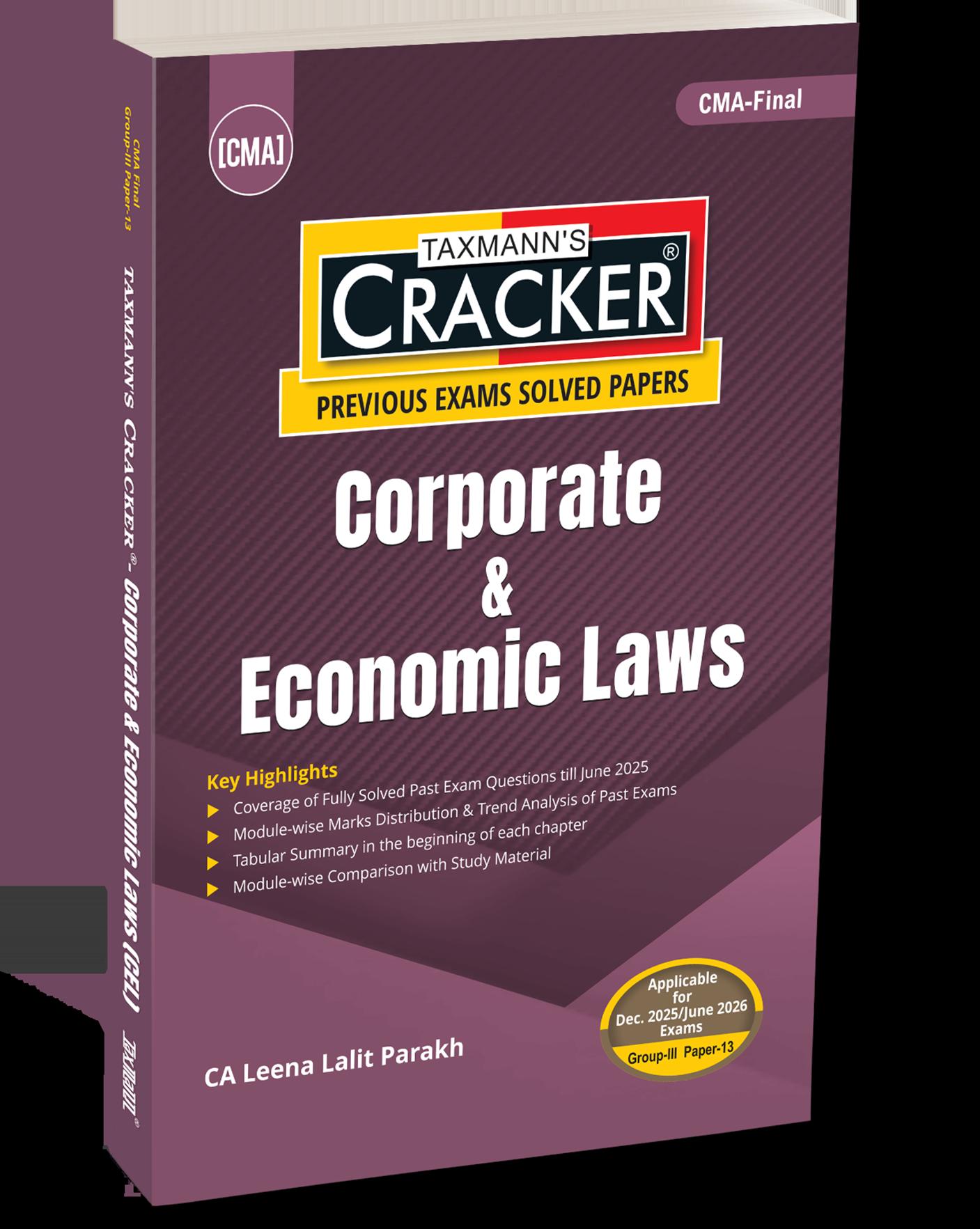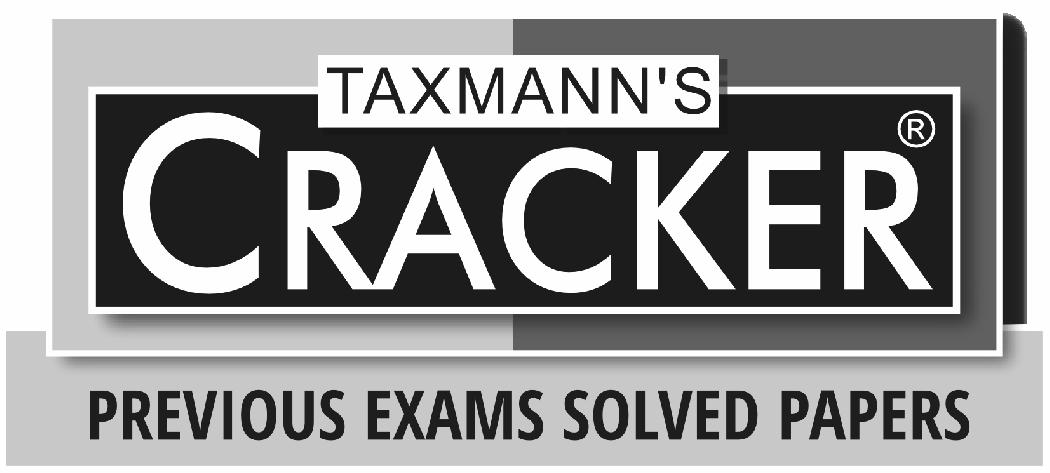





© All rights reserved
Price : ` 895
First Published : August 2025
Published by :
Taxmann Publications (P.) Ltd.
Sales & Marketing : 59/32, New Rohtak Road, New Delhi-110 005 India
Phone : +91-11-45562222
Website : www.taxmann.com
E-mail : sales@taxmann.com
Regd. Office : 21/35, West Punjabi Bagh, New Delhi-110 026 India
Printed at :
Tan Prints (India) Pvt. Ltd.
44 Km. Mile Stone, National Highway, Rohtak Road Village Rohad, Distt. Jhajjar (Haryana) India
E-mail : sales@tanprints.com
Disclaimer
Every effort has been made to avoid errors or omissions in this publication. In spite of this, errors may creep in. Any mistake, error or discrepancy noted may be brought to our notice which shall be taken care of in the next edition. It is notified that neither the publisher nor the author or seller will be responsible for any damage or loss of action to any one, of any kind, in any manner, therefrom. It is suggested that to avoid any doubt the reader should cross-check all the facts, law and contents of the publication with original Government publication or notifications. No part of this book may be reproduced or copied in any form or by any means [graphic, electronic or mechanical, including photocopying, recording, taping, or information retrieval systems] or reproduced on any disc, tape, perforated media or other information storage device, etc., without the written permission of the publishers. Breach of this condition is liable for legal action. For binding mistake, misprints or for missing pages, etc., the publisher’s liability is limited to replacement within seven days of purchase by similar edition. All expenses in this connection are to be borne by the purchaser. All disputes are subject to Delhi jurisdiction only.
Module-wise Comparison with Study Material
CHAPTER 1.9
MODULE 2 INSOLVENCY AND BANKRUPTCY CODE, 2016
CHAPTER 2.1
CHAPTER
MODULE 3 CORPORATE GOVERNANCE, SOCIAL RESPONSIBILITY AND SUSTAINABILITY
CHAPTER
SECTION B
ECONOMIC LAWS & REGULATIONS
MODULE 4 SEBI LAWS & REGULATIONS
CHAPTER
MODULE 5 THE COMPETITION ACT, 2002
CHAPTER 5.1
CHAPTER
CHAPTER 6.3
CHAPTER
MODULE 7 LAWS AND REGULATIONS RELATED TO BANKING SECTOR
CHAPTER 7.1
CHAPTER 7.2
CHAPTER 7.3
MODULE 8 LAWS AND REGULATIONS RELATED TO INSURANCE SECTOR
CHAPTER
MODULE 9 SPECIFIC LEGAL PROVISIONS RELATED TO MSME SECTOR
CHAPTER 9.1
CHAPTER 9.2
MODULE 10 LAWS AND REGULATIONS RELATED TO CYBER SECURITY AND DATA PRIVACY
CHAPTER
CHAPTER 10.2
BASIC PRINCIPLES OF DATA PRIVACY, DATA PRIVACY & BUSINESS INTELLIGENCE
CHAPTER 10.2 CYBERCRIME/CYBER FRAUDS – MEANING, REMEDIES & PENALTIES
MODULE 11 LAWS AND REGULATIONS RELATED TO ANTI-MONEY LAUNDERING
CHAPTER 11.1 THE PREVENTION OF MONEY LAUNDERING ACT, 2002
CHAPTER 11.2 THE PREVENTION OF MONEY LAUNDERING (MAINTENANCE OF RECORDS) RULES, 2005

BOARD MEETINGS AND PROCEDURE
A QUICK REVIEW
Chapter XII of the Companies Act, 2013 includes the provisions as to conduct of Board Meetings, Constitution of Audit Committee, Nomination and Remuneration Committee and Stakeholders Relationship Committee, Powers of the Board, Restrictions on the Powers of the Board, Prohibition regarding Political contributions etc.
FREQUENCY OF BOARD MEETINGS SECTION 173(1)
Every company shall hold the first meeting of the Board of Directors within 30 days of the date of its Incorporation and thereafter minimum of 4 meetings shall be held every year provided that the gap between two consecutive board meetings shall not be more than 120 days unless exempted by the Central Government.
Exceptions:
A one-person company, small company and dormant company shall be deemed to have complied with the provisions of section 173, if at least one meeting of the Board of Directors has been conducted in each half of a calendar year and the gap between the two meetings is not less than 90 days. This provision will not apply where OPC is having only one director.
As per Secretarial Standards, Committees shall meet as often as necessary subject to the minimum number and frequency stipulated by the Board or as prescribed by any law or authority.
As per Secretarial Standards, where a company is required to appoint Independent Directors under the Act, such Independent Directors shall meet at least once in a calendar year.
Notice of the meeting
Section 173(3) provides that, every board meeting shall be called by giving at least 7 days’ notice in writing to all the directors at their registered address (whether in India or outside India). The notice may be sent by hand delivery or by post or by electronic means.
Meeting of the Board of Directors may be called on a shorter notice (than 7 days) in order to transact an urgent business, subject to the condition that at least one independent director, if any, shall be present at the meeting. If no independent director is present, then the decisions taken at such a meeting shall be circulated to all the directors and shall be final only on ratification thereof by at least one independent director, if any. The fact that meeting is being called at shorter notice, shall be stated in the notice.
The SS-1 (Secretarial Standards on the Meeting of Board) provides that: Where director speci es a particular means of delivery of notice, notice shall be given to him by such means only.
SECTION A : CORPORATE LAWS
Notice shall be issued by the Company Secretary or where there is no Company Secretary, by any director or any other person authorized by the Board for the purpose.
The notice shall specify the serial number, day, date, time and full address of the venue of the meeting.
In case the facility of participation through Electronic Mode is being made available, the notice shall provide the available option of such facility, information to avail such facility, and contact number or e-mail address of the Chairman or Company Secretary or any other authorized person to whom director shall con rm as to whether they will participate through electronic mode in the meeting.
The Agenda, setting out the business to be transacted at the meeting, and Notes to agenda shall also be sent to all the directors along with Notice of the Board Meeting.
Each meeting and item of the business to be taken up in the meeting shall be serially numbered.
Proof of sending notice, agenda and notes on agenda and their delivery shall be maintained by the company.
Every Meeting shall have a serial number.
A meeting may be convened at any time and place, on any day, excluding a National Holiday.
Quorum for meetings of board (Section 174)
A quorum is the minimum number of qualified persons who must be present in order to transact business at a duly convened Board meeting. A meeting shall not be deemed to have been properly held unless the quorum was present at that meeting. Presence of requisite Quorum validate decision taken at a meeting.
The quorum for a Board Meeting shall be 1/3rd of its total strength or 2 directors, whichever is higher.
The directors who participate by video conferencing or by other audio visual means shall also be counted for the purpose of quorum.
The continuing directors may act notwithstanding any vacancy in the Board; but, if the number is reduced below the quorum fixed by the Act for a meeting of the Board, the continuing (remaining) directors or director may act for the purpose of increasing the number of directors to that fixed for the quorum, or of summoning a general meeting of the company and for no other purpose.
Where at any time the number of interested directors exceeds or is equal to 2/3rd of the total strength of the Board of Directors, the quorum shall be the number of directors who are present at the meeting and not interested directors and are not be less than 2.
Interested director means every director of a company who is in anyway, whether directly or indirectly, concerned or interested in a contract or arrangement or proposed contract or arrangement which is placed in agenda of the meeting.
Notes:
Section 8 Companies under the Act shall constitute quorum for the Board meeting, either eight members or 25% of its total strength whichever is less.
Provided that quorum shall not be less than two members.
The provisions of section 174 are not applicable to one-person company in which there is only one director on its Board of directors.
For the purpose of calculating quorum, any fraction of a number shall be rounded off as one.
Total strength shall not include directors whose places are vacant.
As per the SS-1 (Secretarial Standards on the Meeting of Board):
Quorum shall be present throughout the meeting.
In case of committee meetings, the presence of all members of any committee constituted by the Board is necessary to form the quorum for the meetings of such committee unless otherwise stipulated in the Act, or any other law, or the Articles or by the Board.
Passing of resolution by circulation [Section 175]
It is always desirable that the business of the Board is discussed and decided in the board meeting only. However, there may be instances where a decision of the Board is to be taken but there no time to call a meeting or immediate meeting is not possible for some reason. Though the Act requires certain business to be approved only at meetings of the Board, the law has provided to deal with such a situation by passing resolution through circulation without holding a meeting. The Act allows the Board of directors to pass resolution by circulation also. No resolution shall be deemed to have been duly passed by the Board or by a Committee thereof by circulation unless:
The resolution has been circulated in draft, together with the necessary papers, if any, to all the directors, or members of the Committee, as the case may be, at their addresses registered with the company by hand delivery or by post or by courier, or through such electronic means as may be prescribed, and has been approved by a majority of the directors or members, who are entitled to vote on the resolution.
If at least 1/3rd of the total number of directors of the company for the time being require that any resolution under circulation must be decided at a meeting, the chairperson shall put the resolution to be decided at a meeting of the Board.
A resolution that has been passed by circulation shall have to be necessarily be noted in the next meeting of board or the committee, as the case may be, and made part of the minutes of such meeting.
According to Secretarial Standards, not more than 7 days from the date of circulation of draft resolution shall be given to the Directors to respond.
COMMITTEES/ OBLIGATIONS
SECTION A : CORPORATE LAWS
COMMITEES OF THE BOARD
SECTION COMPOSITION CHAIRPERSON CONDITIONS
AUDIT COMMITEE 177 Minimum 3 directors of which majority are independent directors.
VIGIL MECHANISM
177(9) Same as Audit Committee.
NRC COMMITTEE 178 Minimum 3 nonexecutive directors of which majority must be independent directors.
STAKEHODERS RELATIONSHIP COMMITTEE
178(5) As may be decided by Board.
Independent director Listed and Public co. with PUC ≥ `10 cr or Public co. with turnover ≥ `100 cr or Public co. with outstanding loans, debentures, deposits > ` 50 cr.
Independent director Listed and companies which accept deposits from public; companies which have borrowed from banks of PFI > ` 50 cr.
Executive/nonexecutive. Same as Audit Committee.
Non-executive director and such other members.
If > 1000 shareholders, debenture or deposit holders and any other security holders
RISK MANAGEMENT COMMITTEE - Majority from Board. Member of Board. -
CSR COMMITTEE 135 If there is requirement of independent director (ID) then with ID or else without ID.
Private company having only 2 directors, then 2.
Foreign company then 2 but of which one must be the resident whose name is given for communication.
Minimum 3 directors of which 1 must be independent director.
Audit Committee
- Companies whose CSR expenditure is > `50 lakhs.
Responsibility of Audit Committee like any other committee, shall be recommendary in nature, but if the Board had not accepted any recommendation, the same shall be
disclosed in such report along with reasons thereof. Every Audit Committee shall act in accordance with the terms of reference specified in writing by the Board which shall, inter alia, include:
The recommendation for appointment, remuneration and terms of appointment of auditors of the company.
Review and monitor the auditor’s independence and performance, and effectiveness of audit process.
Examination of the nancial statement and the auditors’ report thereon.
Approval or any subsequent modi cation of transactions of the company with related parties.
The Audit Committee may make omnibus approval for related party transactions proposed to be entered by the company subject to such conditions as may be prescribed.
Scrutiny of inter-corporate loans and investments.
Valuation of undertakings or assets of the company, wherever it is necessary.
Evaluation of internal nancial controls and risk management systems.
Monitoring the end use of funds raised through public offers and related matters.
The Audit Committee shall have authority to investigate into any matter in relation to the items speci ed above for this purpose may obtain professional advice from external sources and have full access to information contained in the records of the company.
Role of auditor in Audit Committee: According to section 177(5), the Audit Committee is empowered to call for the comments of the auditors about internal control systems, the scope of audit, including the observations of the auditors, review of financial statement before their submission to the Board and discuss any related issues with the internal and statutory auditors and the management of the company.
The auditors of a company and the key managerial personnel shall have a right to be heard in the meetings of the Audit Committee when it considers the auditor‘s report but shall not have the right to vote.
Board Report shall disclose the constitution of Audit Committee and where Board has not accepted any recommendation of the Audit Committee, the same shall be disclosed.
Vigil Mechanism
The vigil mechanism shall provide for adequate safeguards against victimization of persons who use such mechanism and make provision for direct access to the chairperson of the Audit Committee in appropriate or exceptional cases. It is imperative for the company to disclose the details of the establishment of vigil mechanism on the website of the company and in Board’s report.
According to the Companies (Meetings of Board and its Powers) Rules, 2014:
Persons who use such mechanism means employees and directors who avail the vigil mechanism.
The audit committee shall oversee the vigil mechanism and if any of the members of the committee have a con ict of interest in a given case, they
SECTION A : CORPORATE LAWS
should recuse themselves and the others on the committee would deal with the matter on hand.
In case of other companies, the board of directors shall nominate a director to play the role of audit committee for the purpose of vigil mechanism to whom other directors and employees may report their concerns.
The employees and directors who avail of vigil mechanism may have direct access to the chairperson of the audit committee or the director nominated to play the role of audit committee, as the case may be, in exceptional cases.
In case of repeated frivolous complaints being led by a director or an employee, the audit committee or the director nominated to play the role of audit committee may take suitable action against the concerned director or employee including reprimand.
Duties of directors
The following duties have been prescribed for a director under the said section:
He shall act in accordance with the articles of the company, subject to the provisions of this Act.
He shall act in good faith in order to promote the objects of the company and in the best interests of the company, its employees, the shareholders, and the community and for the protection of environment.
He shall exercise his duties with due and reasonable care, skill and diligence and shall exercise independent judgment.
He shall not involve in a situation in which he may have a direct or indirect interest that con icts, or, with the interest of the company.
He shall not achieve or attempt to achieve any undue gain or advantage either to himself or to his relatives, partners, or associates.
He shall not assign his of ce.
Liabilities of directors
The liabilities of the directors may be grouped under certain heads for convenience of consideration and discussion. They are:
Liability to outsiders
Liability to the company
Liability to shareholders
Liability to statutory authorities
Powers related to political contributions
Section 182 of the Act provides for prohibitions and restrictions regarding political contributions. According to this section a company may contribute any amount directly or indirectly to any political party. Here, political party means a political party registered under section 29A of the Representation of the People Act, 1951.
The following companies are not allowed to contribute to any political party: Government company; and
A company which has been in existence for less than three nancial years.
There is no limit on the amount of contribution, such contribution shall be made through a resolution passed at a meeting of the Board of Directors.
PAST EXAMINATION QUESTIONS
OBJECTIVE QUESTIONS
FILL IN THE BLANKS
Q. 1 Every Company shall hold the first meeting of the Board of Directors within __________ of the date of incorporation. [June 2017, 1 Mark]
Ans. 30 days
Q. 2 The Director prepared the Annual Accounts in Director Responsibility Statement on a _________ basis.
[Dec. 2022, 1 Mark]
MULTIPLE CHOICE QUESTIONS
Q. 1 A company has 9 Directors, on 01-1-2016. The office of 2 Directors have fallen vacant on 2-1-2016. The quorum required for conducting a Board meeting is:
(
a) 4
(
b) 3
(
c) 2
(
d) 5
Ans. (b) 3
[Dec. 2017, 2 Marks]
Q. 2 Out of following which item cannot be exercised by the Board of Directors of ABC Ltd.?
(a) To diversify the business of the company
(b) To take over a company
(c) To approve amalgamation, merger or the reconstruction
(d) To sell of the whole or substantially the whole of the undertaking of the company.
[Dec. 2019, 2 Marks]
Ans. Going concern
ANSWER IN ONE LINE
Q. 1 Financial statement with respect to small company may not include cash flow statement. Do you agree?
[Dec. 2021, 1 Mark]
Ans. Yes.
Ans. (d) To sell off the substantially the whole of the undertaking of the company.
Q. 3 In the case of a meeting of the Board of directors or of a committee of the board, the minutes shall also contain.
(
(
a) The names of the directors present at the meeting.
b) In the case of each resolution passed at the meeting, the names of the directors, if any, dissenting from or concerning with the resolution.
(
c) Both of the above
(d) None of the above
[Dec. 2021, 1 Mark]
Ans. (c) Both of the above
Q. 4 Under section ________ every company shall hold minimum _____ meetings of its board of directors every year.
(a) 183, 6
(b) 173, 4
(c) 104, 7
(d) 114, 4
Ans. (b) 173, 4
SECTION A : CORPORATE LAWS
[Dec. 2022, 2 Marks]
Q. 5 In case of related party transaction for leasing of property of any kind exceeding of the turnover of the company or whichever is lower, approval of the company by special resolution required.
(
a) 20%, ` 200 Crore
(b) 10%, ` 100 Crore
(
c) 20%, ` 100 Crore
(d) 10%, ` 200 Crore
[Dec. 2022, 2 Marks]
Ans. (b) 10%, `100 crore
Q. 6 For Board meeting, quorum as per the Companies Act, 2013 is:
(a) 1/3rd of the total number of Directors.
(b) 2/3rd of the total number of Directors.
(
c) 1/3rd of the total number of Directors or two whichever is higher.
(d) ½ of the total number of Directors.
[June 2023, 2 Marks]
Ans. (c) 1/3rd of the total number of Directors or two whichever is higher.
Q. 7 Under what circumstances, one person can constitute a quorum?
(
a) If the Tribunal Calls or directs the calling of an Annual General Meeting.
(
b) In case of class meeting, if all the shares of a particular class are held by 1 (one) person, he shall constitute the quorum.
(
c) If the shareholders want that the presence of one person can constitutes quorum
(d) Both (a) and (b)
[June 2023, Marks2]
Ans. (d) Both (a) and (b)
Q. 8 Consolidated financial statements shall be sent in not less than 21 days before the date of meeting, may be sent less than 21 days before, if shareholders with __________ voting rights.
(a) 75%
(b) 80%
(c) 90%
(d) 95%
Ans. (d) 95%
[Dec. 2023, 2 Marks]
Q. 9 XYZ Co. Ltd. was incorporated on 1st April, 2023. It’s paid up capital of ` 10 lakh consisting of 1 lakh equity shares of `10 each was held by 100 individuals. There are 6 directors on its Board. The quorum for the Annual General Meeting is _________ members to be present personally (AoA has not stipulated larger number).
(a) 2
(b) 5
(c) 10
(d) 15
Ans. (b) 5
[June 2024, 2 Marks]
Q. 10 The Board of Directors of a limited company wants to co-opt an expert in a specialized field. In this context, the correct option is:
(a) The tenure of the expert directors shall not exceed such period as may be speci ed in the Articles.
(b) An additional director can be appointed exceeding one- fth of the total number of directors.
(c) The tenure of the expert directors shall not exceed one year.
(d) Expert directors can be appointed exceeding one- fth of the total number of directors.
[June 2024, 2 Marks]
Ans. (a) The tenure of the expert directors shall not exceed such period as may be specified in the Articles.
THEORY QUESTIONS
Q. 1 Write short notes on the Constitution of Audit Committee under section 177 of Companies Act, 2013.
[Dec. 2015, 3 Marks]
Ans.
As per section 177(1) of Companies Act, 2013, the Board of directors of every listed public company and such other class or classes of companies, as may be prescribed, shall constitute an Audit Committee.
As per Rule 4 of Companies (Appointment and Qualifications of Directors) Rules, 2014, the following classes of companies shall constitute an Audit Committee
All public companies with a paid up capital of ` 10 crore rupees or more; or
All public companies having turnover of ` 100 crore rupees or more; or
All public companies, having in aggregate, outstanding loans, debentures and deposits exceeding ` 50 crore.
The paid-up share capital or turnover or outstanding loans or debenture or deposits, as the case may be, as existing on the date of last audited Financial Statements shall be taken into account for the purposes of this rule.
As per section 177(2) of Companies Act, 2013, the Audit Committee shall consists of a minimum 3 directors with independent directors forming majority. Majority directors including chairperson shall be persons with ability to read and understand the financial statement.
Q. 2 Examine with reference to the provisions of the Companies Act, 2013 whether notice of a Board Meeting is required to be sent to the following persons: An interested Director, a Director who has expressed his inability to attend a particular Board Meeting, and a director who has gone abroad less than 3 months.
[Dec. 2015, 3 Marks; June 2017, 6 Marks]
Ans.
As per section 173(3) of the Companies Act, 2013, a meeting of the board shall be called by giving not less than 7 days’ notice in writing to every director at his registered address. This makes it mandatory for every director to be given proper notice of every board meeting. It is immaterial whether a director is interested or not.
An Interested Director: Notice must be given to a director even though he is precluded from voting at the meeting on the business to be transacted.
A Director who has expressed his inability to attend a particular Board Meeting: In terms of section 173(3) even if a director states that he will not be able to attend the next Board meeting; notice must be given to that director.

